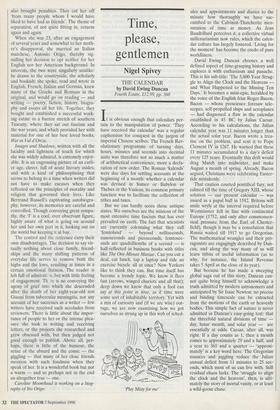A cautious confession
Caroline Moorehead
IMAGES AND SHADOWS by Iris Origo John Murray, £20, pp.288 As a biographer, his Origo was tough not only on herself, but on others. Veracity and enthusiasm, she maintained, were both essential to any decent biographer, and woe betide anyone impertinent or foolish enough to suppress or invent mate- rial, or to sit in judgment on their subject. Over autobiography, she felt rather differ- ently, as she makes clear in an introduc- tion to her book of memoirs, Images and Shadows, now republished almost exactly ten years, after her death. Here more — or perhaps less — is allowed. The story you tell can be as partial as you choose to make it: le secret d'ennuyer est celui de tout dire. 'I have no wish,' she wrote sternly, `to convert, to reveal or to confess.' Her own autobiography was to be 'merely an attempt to describe past ways of living, and a few phases of my own life'. Though she intended, as she put it, `to speak, at last, my own mind', it is never, as she admits, her whole mind.
She kept her word. The scenes she selected to describe, when she sat down to write in 1970, at the age of 68, dealt largely with her childhood and background. Two thirds of the book cover her first 20 years, leaving a bare hundred pages to talk about the next 48. They tell of growing up in a world of money and privilege, of her grandfather Lord Desart and Desart Court in Kilkenny, of her father Bayard Cutting and the Cutting mansion, Westbrook, on the outskirts of Washington, of coming out in Florence, London and New York, and of spending her adolescence in the Villa Medici in Florence, where Bernard Berenson advised on her classical educa- tion. She spoke of her three years learning Greek and Latin together, as living lan- guages, as having provided her with the happiest hours of her life. Sympathetically, she also reported herself as having been gauche, plump and singularly graceless compared to her contemporaries, a por- trait that sits ill with the many descriptions of her throughout her long life as a woman of immense elegance. It was, she con- fessed, often highly enjoyable to have experienced such a life, but the privileges also brought penalties. They cut her off `from many people whom I would have liked to have had as friends'. The theme of separation, of not quite fitting in, returns again and again.
When she was 23, after an engagement of several years and somewhat to her moth- er's disapproval, she married an Italian marchese, Antonio Origo, thereby sig- nalling her decision to opt neither for her English nor her American background. In interests, the two were singularly unalike: he drawn to the countryside, she scholarly and bookish: she spoke, read and wrote in English, French, Italian and German, knew many of the Greeks and Romans in the original, and would go on reading — and writing — poetry, fiction, history, biogra- phy and essays all her life. Together, they bought and established a successful work- ing estate in a barren stretch of southern Tuscany, where they sat out fascism and the war years, and which provided her with material for one of her best loved books, War in Val d'Orcia.
Images and Shadows, written with all the lucidity and lightness of touch for which she was widely admired, is extremely enjoy- able. It is an engrossing picture of an earli- er age, clever, full of acute literary asides, and with a kind of philosophising that seems to belong to a time when writers did not have to make excuses when they reflected on the principles of morality and religion that governed their lives. Like Bertrand Russell's captivating autobiogra- phy, however, its memories are careful and controlled. Though conveying great sympa- thy, the 'I' is a cool, ever observant figure, highly aware of what is going on around her and her own part in it, looking out on the world but keeping it at bay.
The control and the reticence carry their own disadvantages. The decision to say vir- tually nothing about close family, friend- ships and the many shifting patterns of everyday life serves to remove both the highs and the lows, resulting at times in a certain emotional flatness. The reader is left full of admirati n, but with little feeling of engagement. Th re is no conveying the agony of grief into which she descended after the death of her eight-year-old son Gianni from tubercular meningitis, nor any account of her successes as a writer — few writers have received such accolades from reviewers. There is little about the impor- tance of people to her or the intense plea- sure she took in writing and receiving letters, or the projects she researched and grew obsessed with, but then judged not good enough to publish. Above all, per- haps, there is little of the humour, the sense of the absurd and the comic — the giggling — that many of her close friends mention with such fondness when they speak of her. It is a wonderful book but not a warm — and so perhaps not in the end an altogether true — one.
Caroline Moorehead is working on a biog- raphy of Iris Origo.



























































 Previous page
Previous page